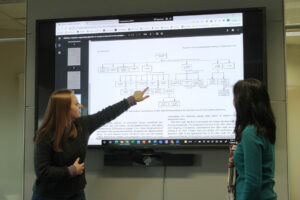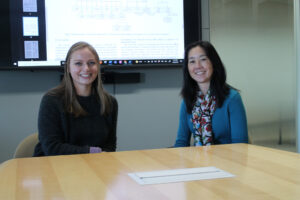
8
February

Their award-winning paper highlights and influences the decision-making process for older adults selecting over-the-counter medications
By Emma Gran
An innovative study led by three researchers from the University of Wisconsin–Madison School of Pharmacy has been celebrated on a national scale for its research excellence and impact on patient health and pharmacy practice.
Health Services Research in Pharmacy graduate student Ashley Morris, Professor and Chair of the Social and Administrative Sciences Division Michelle Chui, senior scientist Aaron Gilson, and Ka Xiong of the Wisconsin Department of Health Services earned the 2021 Best Paper Award from the journal Research in Social and Administrative Pharmacy (RSAP), the field’s leading publication with an impact factor of 3.3.
“Not only is it methodologically outstanding, but its results have very meaningful implications for future research and for interventions aimed to improve medication safety and use among patients with chronic disease highly involved in self-care.”
— Shane Desselle
The team’s paper, Utilizing a cognitive engineering approach to conduct a hierarchical task analysis to understand complex older adult decision-making during over-the-counter medication selection, is the first to investigate the holistic decision-making process surrounding over-the-counter (OTC) medication selection for older adults in a retail pharmacy environment. And with rising evidence showing individuals over 65 are not using OTC medications safely, this study responds to an urgent need to identify interventions that will mitigate potentially harmful medication use.
“Older adults make decisions in the pharmacy that are not straightforward — it’s a very complicated decision-making process,” says Morris, the study’s lead author. “But it’s difficult to figure out how we can intercept older adults who are making unsafe decisions because their OTC selection process is so complex.”

To shed light on the process, the multidisciplinary research team identified a variety of system and individual-level factors that drive older adults’ decision-making about OTC medications — including cost, regimen, past experiences, and appropriateness of the OTC for their symptoms — which will provide pharmacists with critical insights into safety issues that this at-risk population may not be considering when purchasing and using OTCs.
Their study also explored the first and only pharmacy-based physical redesign intervention — dubbed the Senior SectionTM — that can effectively alter older adults’ shopping choices in the pharmacy aisle and cultivate safer OTC medication use without increasing pharmacists’ workloads.
“Their article is an absolutely terrific one and embodies the journal’s reasons for its founding and existence,” said Shane Desselle, RSAP editor-in-chief. “Not only is it methodologically outstanding, but its results have very meaningful implications for future research and for interventions aimed to improve medication safety and use among patients with chronic disease highly involved in self-care.”
Understanding decision-making
Preventing over-the-counter medication misuse presents a different set of problems than prescription drugs because physician approval is not required to purchase OTCs, so reducing harm depends heavily on the patient and their decisions when taking OTCs.
“There’s this assumption that OTCs are safe, and consequently some patients treat them like candy,” says Chui, Hammel-Sanders Distinguished Chair in Pharmacy Administration and director of the School’s Sonderegger Research Center for Improved Medication Outcomes (SRC). “Patients think one is good, two is better, and if symptoms persist, just take three, take four, take five — but there are real safety implications of that, and no one is really talking about it.”
The types of medication errors that could come from OTC use have previously been completely invisible, she says, and there’s been a dearth of research and policy related to improved OTC labeling and communication of risks, to make sure they are used safely. Older adults face particularly heightened risks.
“There’s this assumption that OTCs are safe, and consequently some patients treat them like candy […] but there are real safety implications of that, and no one is really talking about it.”
— Michelle Chui
Inadequate knowledge about age-related physiological changes that may make certain OTC medications dangerous to take, as well as declining cognition, memory lapses, and lengthy lists of prescription medications can lead adults older than 65 to experience increased frequency of adverse effects from over-the-counter medications. For example, certain cough, cold, and allergy medications are associated with adverse geriatric outcomes like falls or worsened adherence to their prescriptions, and acetaminophen-related toxicities account for up to 50 percent of all acute liver failures annually.

To mitigate adverse impacts from and misuse of OTC medications, the team implemented a physical redesign intervention —shifting the shelves of a community pharmacy to create a dedicated Senior Section with signage to aid in selection of lower-risk OTCs and within proximity of the pharmacy counter to promote pharmacy staff interactions — and used a think-aloud interview process to see if older adults’ decision-making process changed if exposed to the intervention while selecting OTCs.
By using Cognitive Task Analysis, the researchers were able to aggregate all the different considerations older adults make when choosing an OTC medication to treat either pain, sleep, or cough/cold/allergy symptoms. In the first pharmacy chain that implemented the Senior Section, they also demonstrated the Senior Section’s effectiveness in reducing OTC medication misuse without adding extra work to the pharmacist’s plate.
“The intervention made the process simpler and easier, and the things that older adults did pay attention to, in their assessment of OTCs, were actually more related to safety, rather than related to things like location and cost,” Morris says. “So not only was the process simpler, but it was a higher quality process.”
Expanding reach
Morris, Gilson, and Chui have been working together applying systems engineering concepts to pharmacy research for many years, collecting data on older adult OTC medication safety through several preliminary studies, including focus groups with patients and pharmacy staff, and many interviews with older adults that ultimately resulted in the development of the ‘Senior Section’ intervention.

“A lot of the findings from our previous studies are carrying over and informing the process as we go along,” says Gilson. “If I knew our research led to people actually considering and adopting Cognitive Task Analysis in their research and, even more importantly, to appreciate the critical nature of how a multidisciplinary research team can contribute to an overall understanding in research in pharmacy, I would be very happy.”
The team already launched a new project and are conducting interviews within the Advocate Aurora health system pharmacies to gather more data and further refine their physical intervention to make it more patient-friendly and adaptable to other settings.
“This paper describes all we have learned so far about older adults’ decision-making and all the resources and information sources they use to gather knowledge about OTCs,” says Morris. “And now, it’s allowing us to continue refining what we’ve learned, so that we can make a more impactful difference going forward.”




